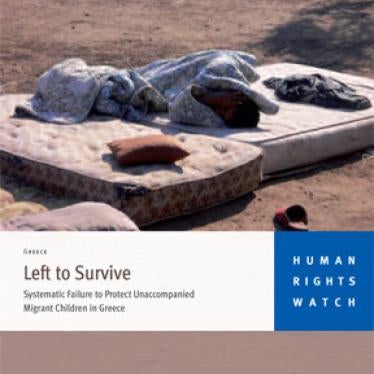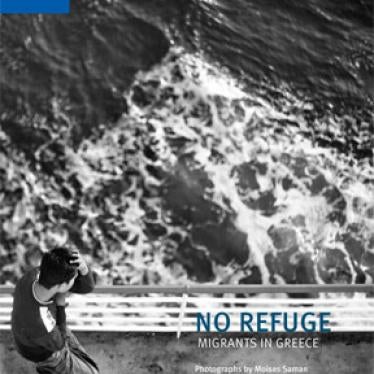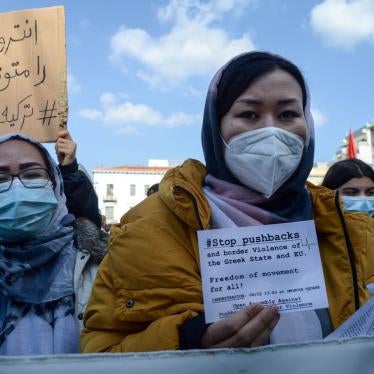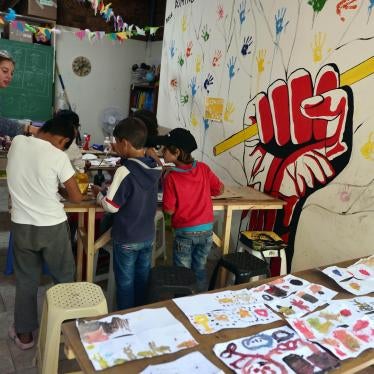The European Court of Human Rights ruled last week that Belgium had violated the rights of an Afghan asylum seeker when it returned him to Greece, finding that the conditions in which he was held were inhuman and degrading. Germany had announced a few days earlier that it was suspending returns of asylum seekers to Greece for a year to give Greece time to "improve conditions." Yet, border police from several EU countries, including Germany, are deployed to the Greek-Turkish border, where they transport migrants in windowless vans to these same degrading and inhuman conditions in Greek detention centers.
The case, M.S.S. v. Belgium and Greece, concerns an Afghan who worked as a translator for the American military and fled, fearing revenge. He entered the EU through Greece, then sought asylum in Belgium. The European Court decided that Belgium should not have returned M.S.S. to Greece because Belgian officials knew he would be exposed to detention and living conditions that amounted to degrading treatment and because they knew of its failed asylum system, with an asylum approval rate of less than 0.1 percent in 2008. The ruling directly challenges the "Dublin II regulation," which says that the member state where an asylum seeker first sets foot is responsible for examining that person's refugee claim.
With 960 similar cases challenging the return of asylum seekers to Greece pending before the European Court, M.S.S. represents an important judicial precedent.
But what does this judicial ruling say about current EU executive policies? While many member states have stopped sending migrants to Greece, they have also recently deployed their national police forces to perform border enforcement in Greece as part of the rapid border intervention team (RABIT) under the EU border agency, Frontex. They apprehend migrants who cross the Evros River from Turkey, and turn them over to their Greek counterparts, who put them behind bars.
When M.S.S. filed his complaint with the court, countries like Germany could argue that they were not formally responsible for abuses in Greece. They returned asylum seekers to Greece on the false presumption that they would be treated decently and provided a genuine opportunity to pursue refugee claims. But because of Frontex, Germany and other EU members are no longer passive participants in this abusive system from afar, but have now become part and parcel of the systematic human rights violations of migrants in Greece.
During a recent Human Rights Watch mission to the Greece/Turkey border, a high-ranking Frontex official told us that the police working with Frontex are "not allowed" to enter the detention cells and have not witnessed what is going on there.
But we did look, and we know what is going on. We saw grossly overcrowded and unsanitary conditions where detainees did not have enough space to lie down to sleep, where women and children were held together in cells with unrelated men, and where toilet facilities were so inadequate that guards sometimes had to escort detainees to defecate and urinate in nearby fields. We met a 14-year-old Eritrean boy who told us he was beaten by the police, that he had to share a bed with five other migrant-children, that he did not have soap or enough to eat; and that guards took and threw away his SIM card, his only link to his family.
Even if Frontex personnel have not been allowed to look inside the detention centers, they have been close enough to smell their stench. In fact, as Der Spiegel reported, German police deployed as members of RABIT have complained of violence against detainees, and expressed worry that the police might be implicated in illegal acts. Eager to avoid criminal liability, they pleaded for clearer rules.
The European Commission recently decided to extend RABIT through March. But after the court's landmark ruling, European governments should ask how it can be legal or proper for police from EU member states like Germany to go to Greece to apprehend migrants (many of whom are probably asylum seekers). They should ask how these police can turn a person over to Greek detention centers when it would be a breach of their human rights obligations for a similarly situated person to be put on a plane in Berlin, flown to Athens, and detained in those same facilities.
As German police have already blown the whistle on abuses they suspect are happening behind closed Greek detention center doors, and since Germany has already suspended Dublin II transfers to Greece, the German government should be the first to break with the RABIT deployment and withdraw its police presence at the Greek-Turkish border until Greece establishes humane conditions in its detention centers and provides an effective remedy for asylum seekers needing protection.
Troller, Senior Researcher in Human Rights Watch's Children's Rights Division, is the author of Left to Survive: Protection Breakdown for Unaccompanied Children in Greece.








